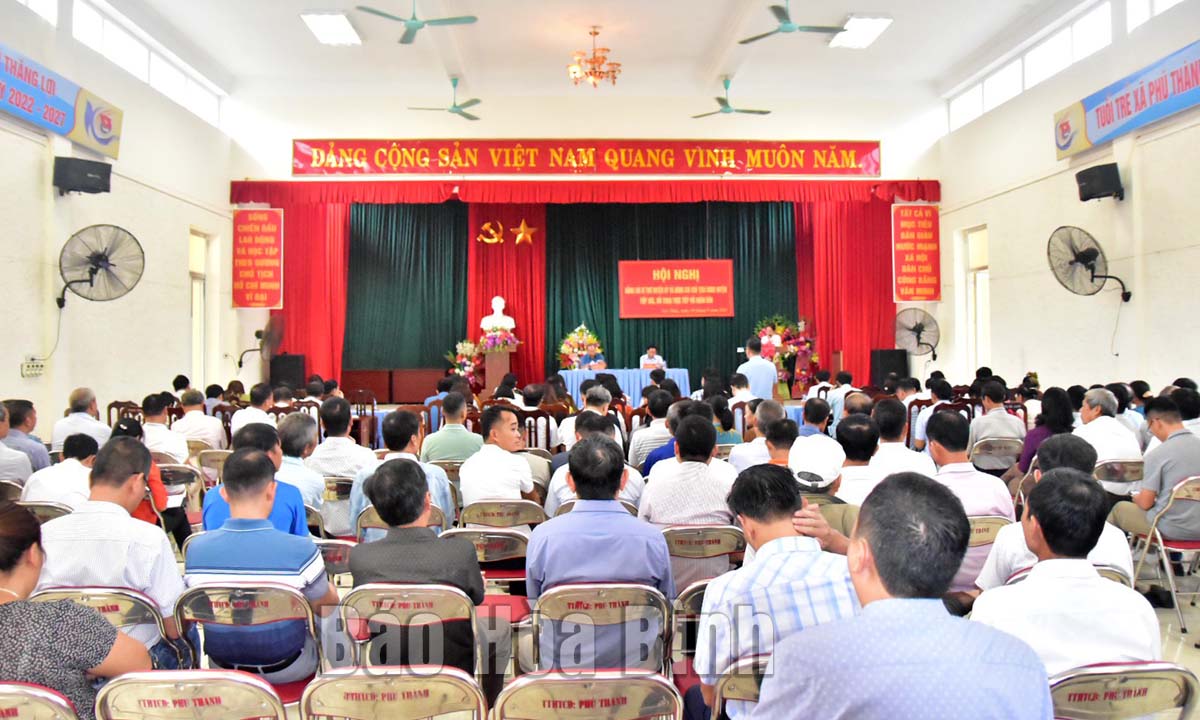
(HBO) – Lac Thuy district has solved many problems, especially the relationship between the Party and the people, and between cadres and the people, at the grassroots level thanks to dialogues between local authorities with residents.

Leaders
of Lac Thuy district hold a dialogue with the people of Phu Thanh commune and
some neighbouring communes and towns.
In September, the district organised two meetings between leaders of the Party
Committee, People's Council and People's Committee of the district and over 400
people in eight communes and towns. Twenty-three opinions and over 400
recommendations were raised at the events, focusing on the fields of
socio-economic development, security and land management such as investment
attraction, environmental pollution, job creation for rural workers; granting
of land use right certificates and compensation for site clearance.
Representatives of relevant agencies explained the issues within their
competence and assigned specialised units to verify those that take time to clarify.
Previously, the number of petitions and complaints was relatively high in the
district, mainly related to the field of land, compensation, resettlement
support and site clearance. It was attributed to the fact that people could not
meet leaders to express their wishes, or due attention hasn’t been paid to the
opinions and recommendations of local people. In addition, many suggestions
have not been properly resolved.
The organisation of dialogues with local residents over the past three years
has helped the district's leaders to get closer to the people, understand their
lives, thoughts and aspirations and detect emerging problems. Thus, the number
of disputes and lawsuits were minimised while preventing the occurrence of hot
spots that complicate the security and order in the locality. The dialogues
also offer opportunities for local authorities to disseminate policies and laws
of the Party and the State to locals.
Secretary of the district Party Committee Bui Trung Kien said the purpose of
the dialogues is to get closer to the people, understand them, listen to their
feedback and explain issues under local authority. This is an opportunity for
local Party committees, administration, cadres, party members and people to
work together to solve difficulties and pressing problems, put forth specific
orientations and solutions, meet legitimate expectations and contribute
to the successful implementation of socio-economic development, security and
defence tasks in the locality./.
In the spirit of "Party members go first, the people follow”, all households of Party members in the Doan Ket sub-region in Da Bac town, Da Bac district, voluntarily removed gates and fences, and donated land when the road expansion project passed through their properties. Inspired by their example, 68 households in the sub-region quickly followed suit, contributing over 1,400 sq.m of residential and perennial cropland to widen the main road through the residential area. The exemplary role of Party members in Doan Ket stands as a shining example of studying and following President Ho Chi Minh’s thought, morality, and lifestyle.
The Hoa Binh provincial People's Committee held a monthly meeting on May 29 to assess the implementation of socio-economic development tasks in the first six months of 2025, the progress of key projects, and some other important issues.
During his lifetime, President Ho Chi Minh always expressed his deep affection and special concern for children and youth. He once emphasized: "Caring for and educating children well is the responsibility of the entire Party and the entire people”; "First of all, the family (i.e. grandparents, parents, siblings) must do this job well”. "the Party Committees…, the Children’s Committee, the Youth Union, the education sector, and all related organizations must have specific plans to ensure children grow healthier and more progressive”. His teachings has been remaining valuable and serving as the guiding principles in the work of protecting, caring for, and educating children. In line with this ideology, Hoa Binh Province has continuously been prioritizing and investing resources in the well-being of children in recent years.
Mr. Nguyen Phi Long, the alternate Member of the Party Central Committee and Secretary of the Provincial Party Committee chaired the meeting of the Standing Committee of the Provincial Party Committee to provide opinions on several investment projects within the province. There was the attendance of Ms. Bui Thi Minh, the Permanent Deputy Secretary of the Provincial Party Committee and Chairwoman of the Provincial People’s Council; Mr. Bui Đuc Hinh, the Deputy Secretary of the Provincial Party Committee and Chairman of the Provincial People’s Committee and other members of the Standing Committee; the leaders from other departments, agencies, and some localities.
The Standing Board of the Vietnam Fatherland Front (VFF) Committee of Hoa Binh province held a meeting on May 28 to honour outstanding village elders, village heads, and reputable individuals from local ethnic minority and religious communities.
In mid-May, the provincial Museum organised an exhibition named "Duoi la co Dang Cong san Viet Nam quang vinh” (Under the flag of the glorious Communist Party of Vietnam). This meaningful activity took place in the joyful atmosphere to celebrate the country's major holidays and the Party congresses at all levels for the 2025-2030 term, towards the 14th National Party Congress.



